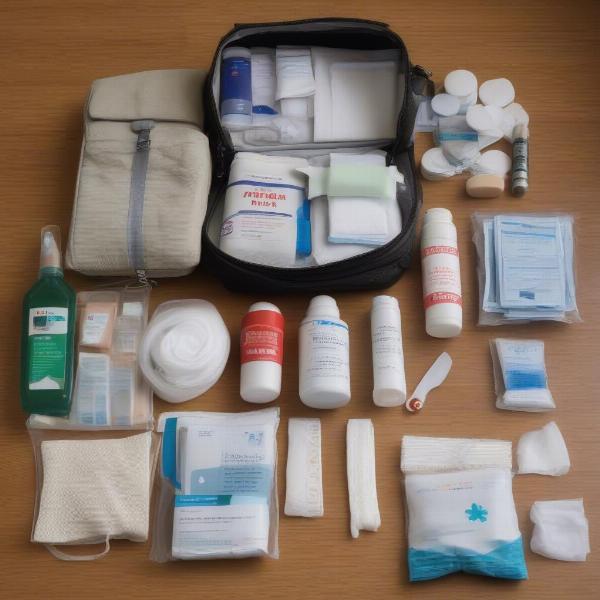Germolene is a common antiseptic ointment found in many households. But can you use Germolene on a dog? The short answer is no. While Germolene might seem like a quick fix for minor cuts and scrapes, it’s not safe for our canine companions. This article will explore why Germolene is unsuitable for dogs and offer safe alternatives for treating minor wounds. We’ll cover everything from understanding the ingredients that make Germolene a no-go for dogs to the best practices for canine first aid.
While Germolene is often used by humans for minor skin irritations, the formulation isn’t suitable for dogs. The key ingredient that causes concern is zinc oxide. If ingested, zinc oxide can cause zinc toxicity in dogs, leading to serious health problems. Dogs often lick their wounds, making ingestion of Germolene almost inevitable. Even small amounts can cause vomiting, diarrhea, and lethargy. In severe cases, zinc toxicity can lead to anemia and even damage to the kidneys and liver. Therefore, using Germolene on your dog, even for seemingly minor issues, is strongly discouraged.
Why Germolene is Not Safe for Dogs
The primary concern with Germolene is its zinc oxide content. While generally safe for humans in topical applications, zinc is toxic to dogs when ingested. Dogs, instinctively licking their wounds, are highly likely to ingest Germolene applied to their skin. This ingestion can lead to zinc poisoning.
Another issue is the potential for allergic reactions. Germolene contains other ingredients, such as phenol, which can cause skin irritation or allergic reactions in some dogs. Even if zinc toxicity isn’t a factor, an allergic reaction can lead to further discomfort and complications.
Safe Alternatives to Germolene for Dogs
So, what should you use instead of Germolene? Fortunately, there are safe and effective alternatives specifically designed for canine first aid. Veterinary-approved antiseptic wipes or sprays are a great option for cleaning minor wounds. These products are formulated to be safe for dogs and often contain ingredients that promote healing.
For more serious wounds, or if you’re unsure about the severity, always consult your veterinarian. They can assess the wound and recommend the appropriate treatment. Never attempt to treat deep wounds or punctures at home. These often require professional veterinary care to prevent infection and ensure proper healing.
What to Do if Your Dog Licks Germolene
If your dog has licked Germolene, contact your veterinarian immediately. The sooner treatment is started, the better the outcome. Symptoms of zinc toxicity can include vomiting, diarrhea, loss of appetite, and lethargy. Your vet will be able to diagnose the issue and provide the necessary treatment to minimize the effects of the zinc poisoning.
First Aid Essentials for Dog Owners
Having a well-stocked canine first aid kit is essential for any responsible dog owner. This kit should include items such as:
- Veterinary-approved antiseptic wipes or spray
- Sterile gauze pads
- Non-adhesive bandages
- Blunt-ended scissors
- Saline solution for cleaning wounds
- Tweezers for removing splinters or ticks
- A pet first aid manual
Keeping these essentials readily available allows you to address minor injuries promptly and effectively. Remember, always consult your vet if you are unsure about the severity of the wound or if your dog exhibits any signs of distress.
 Dog First Aid Kit
Dog First Aid Kit
Conclusion
While Germolene is a common household item for humans, it’s crucial to remember that it’s not safe for dogs. The risk of zinc toxicity from ingestion makes it a dangerous choice for treating even minor wounds. Always opt for veterinary-approved alternatives and consult your vet if you have any concerns about your dog’s health. By being informed and prepared, you can ensure your furry friend receives the best possible care.
FAQ
- What are the signs of zinc toxicity in dogs? Vomiting, diarrhea, loss of appetite, lethargy, jaundice, and abdominal pain.
- Can I use human antiseptic wipes on my dog? No, it’s best to use veterinary-approved antiseptic wipes specifically formulated for dogs.
- What should I do if my dog has a deep wound? Immediately contact your veterinarian.
- Is it okay to bandage my dog’s wound at home? Yes, for minor wounds, but ensure the bandage is not too tight and allows for proper airflow.
- How often should I change my dog’s bandage? Follow your veterinarian’s instructions, typically daily or every other day.
- Can I use Neosporin on my dog? While small amounts of certain types of Neosporin may be safe, it’s best to consult your vet before applying any human medication to your dog.
- What should I put in my dog’s first aid kit? Essential items include antiseptic wipes, gauze pads, bandages, scissors, saline solution, tweezers, and a pet first aid manual.
Related Articles
ILM Dog is your trusted resource for expert advice on dog breeds, health, training, nutrition, grooming, and more. We offer comprehensive information for both new and experienced dog owners, covering everything from puppy care to senior dog needs. should you use anti bacterial wipes on dogs For personalized guidance on dog health and care, connect with us today! Email: [email protected] Phone: +44 20-3965-8624.